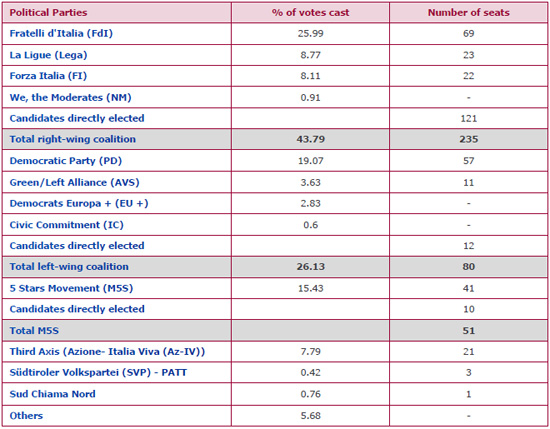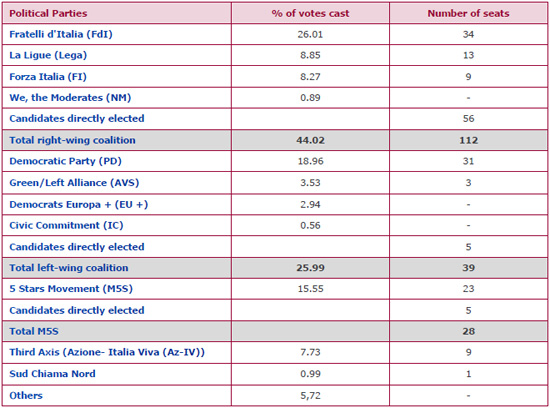Results
Elections in Europe
Corinne Deloy
-

Available versions :
EN
FR
Corinne Deloy
As predicted by all the opinion polls, the coalition of right-wing parties came out ahead by a wide margin in the parliamentary elections held in Italy on 25 September. Fratelli d'Italia (FdI), the populist party led by Giorgia Meloni, which won 4.26% of the vote in the previous parliamentary elections on 4 March 2018, took more than a quarter of the vote (25.99%), becoming the leading Italian political party just ten years after its creation. The League (Lega), another populist party led by Matteo Salvini, on the other hand, halved its result: 8.77% of the vote. Forza Italia (FI), of former Council President (1994-1995, 2001-2006 and 2008-2011) Silvio Berlusconi, held on to a low 8.11% of the vote, also half its 2018 score.
The coalition formed by Fratelli d'Italia, the League and Forza Italia garnered 43.79% of the vote and won an absolute majority in the Chamber of Deputies and the Senate. "For several years now, far-right parties have been gathering almost 40% of voting intentions. But there is a communicating effect between the League and Fratelli d'Italia: when the former drops in the polls, the latter benefits," said Sofia Ventura, a political scientist at Bologna University.
The coalition of left-wing forces led by the Democratic Party (PD), headed by Enrico Letta, which also includes Emma Bonino's Europa+ Democrats (EU+), Europa Verde, Luigi Di Maio's Civic Commitment (IC) and the Green and Left Alliance (AVS), suffered a heavy defeat with 26.13% of the vote. The call for a useful vote to block Giorgia Meloni did not work. The Democratic Party obtained 19.07% of the vote. "The left was unable to interpret social expectations. It substituted civil rights for social rights. It forgot to respond to social demands, such as finding a job, obtaining social recognition, welfare," said Massimiliano Valerii, director of Censis, a socio-economic research institute. "Enrico Letta wanted to reform the party but this snap election did not give him the time to do so. Moreover, the party is still torn between its centrist and radical components," said Marc Lazar, historian and sociologist at Sciences Po.
The Five Star Movement (M5S), a populist party led by Giuseppe Conte, managed to resist with 15.43% of the vote, even though it also halved its result compared to the 4 March 2018 vote. The M5S, which has always made the defence of the most disadvantaged Italians its priority, has fought in recent weeks of campaigning for the maintenance of the citizenship income (reddito di cittadinanza), an income of between €480 and €9,360 per year that can be granted for 18 consecutive months and which benefits more than a million families, and, more generally, for better protection of citizens in the face of rampant inflation and social problems.
The centrist coalition, called Terzo Polo, (third pole) and formed by Carlo Calenda, leader of Azione (Az), and Matteo Renzi, leader of Italia Viva (IV), won 7.79% of the vote. The two leaders are betting on the divisions between the various parties of the right-wing coalition, which could have difficulties in maintaining their unity, which could allow the centrist coalition to impose itself as kingmaker.
The turnout was 64.07%, a sharp decline compared to the 4 March 2018 vote (-9.79 points).
Results of the parliamentary elections of 25 September 2022 in Italy
Chamber of Deputies

Source : Italian Ministry for Home Affairs
Senate

Source : https://elezioni.interno.gov.it/senato/scrutini/20220925/scrutiniSI
"Italians have sent a clear message in favour of a right-wing government led by Fratelli d'Italia," said a delighted Giorgia Meloni after the results. "We will govern for all Italians with the will to unite the people and focus on what brings us together rather than what divides us. It is time to be responsible."
The leader of Fratelli d'Italia campaigned on the issues of immigration and identity, the defence of conservative values (the historical and cultural roots of Europe, the fight against the threat posed by the "Islamisation" of Italy, and the traditional vision of the family based on a man and a woman) and she was also able to speak to entrepreneurs by proposing, for example, a reduction in corporate taxes. All of this was done while holding a moderate and reassuring discourse on Europe (her party is no longer in favour of Italy's withdrawal from the euro zone but is calling for a reform of the European Central Bank). It must be said that Italy is the main beneficiary of the European Union's recovery plan; consequently, given its economic situation, it can hardly give up the €209 billion in European funds allocated to it by Brussels.
Giorgia Meloni's room for manoeuvre is likely to be very limited on the economic front, as the peninsula has high inflation (8%) and a public debt of 150.80% of GDP, the second highest in the EU after Greece. She could more easily make her mark on social issues and on the management of immigration.
The Fratelli d'Italia leader, who does not have much experience of power, will have to get along with her more seasoned allies Matteo Salvini and Silvio Berlusconi, who do not seem to have given up any ambition. As Italy is a country with a high degree of governmental instability, many political observers predict that the future coalition that will lead the peninsula will find it very difficult to last. "Whether the left likes it or not, our government will last five years," promised Giorgia Meloni.
"The challenge for Giorgia Meloni will be to transform her electoral success into a government leadership that can last, that is the great unknown," said Lorenzo De Sio, professor of political science at Luiss University in Rome.
Especially since the coalition parties are divided on certain issues such as the support to be given to Italians in the face of rising energy prices, lower taxes and the possible abolition of the citizenship income. Similarly, there is an ideological opposition between Forza Italia and its two allies on sovereignty and Fratelli d'Italia is at odds with its partners on the issue of the war in Ukraine. Giorgia Meloni has very strongly condemned Vladimir Putin's invasion of Ukraine and strongly supports NATO.
Fratelli d'Italia and the League together won "the highest percentage of votes ever recorded by far-right parties in the history of Western Europe since 1945," noted the Italian Centre for Electoral Studies. "This is undoubtedly the most right-wing majority that republican Italy has seen in its history, but it is not exactly the first time that a right-wing party of fascist origin has entered government," stressed Luca Sollai, a historian at the University of Montreal, referring to the participation of Gianfranco Fini's National Alliance (AN) (a former leader of the Italian Social Movement (MSI), a neo-fascist party founded in 1946) in the government led by Silvio Berlusconi (1994-1995).
"The breakthrough for fascism is not nostalgic. Giorgia Meloni did not put it forward during her election campaign (...) We are facing a protest vote in favour of Fratelli d'Italia, which was, until the eve of the elections, an opposition party", said Luca Sollai. Indeed, FdI has not participated in any government since its creation in 2012. And it has used this fact to attract voters who are distrustful of politics. For Marc Lazar, the alliance between the right and the far right has been made possible in Italy by "Berlusconi's political operation", who in 1994 chose to form a broad alliance with the Northern League, which was regionalist at the time, and with Allianza Nationale, a party that originated in fascism. "This agreement means that there is no political and moral taboo".
Giorgia Meloni, 45, was born in Rome and joined the Youth Front of the Italian Social Movement (MSI) at the age of 15. In 1995, she became national head of student action within the National Alliance, the successor to the MSI. She was elected Member of Parliament for Lazio in 2006 and became Vice-President of the Chamber of Deputies. Re-elected in the 2008 elections, she was then appointed Minister for Youth in Silvio Berlusconi's government. In 2012, together with Ignazio la Russa and Guido Crosetto, two former members of the government, she created Fratelli d'Italia (FdI). She was re-elected MP in the 2013 and 2018 elections. On 25 September 2022, she led the right-wing forces to victory and should, therefore, become the first woman to become President of the Council in Italy.
On the same theme
To go further
Elections in Europe
Corinne Deloy
—
15 April 2025
Elections in Europe
Corinne Deloy
—
25 February 2025
Elections in Europe
Corinne Deloy
—
18 February 2025
Elections in Europe
Corinne Deloy
—
28 January 2025

The Letter
Schuman
European news of the week
Unique in its genre, with its 200,000 subscribers and its editions in 6 languages (French, English, German, Spanish, Polish and Ukrainian), it has brought to you, for 15 years, a summary of European news, more needed now than ever
Versions :



